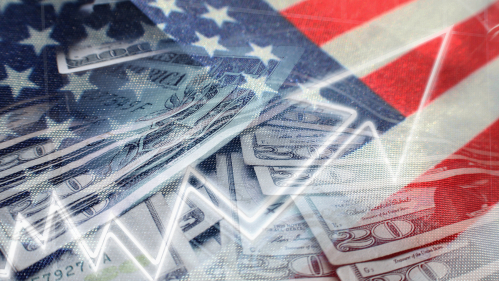Economy Is Top of Mind for New Jersey Voters, Followed by Reproductive Rights

Views split on President Biden and current members of Congress, unfavorable towards Trump
Data collection for this poll finished in early September. Results should be interpreted as a snapshot in time given the nature of public opinion polling and the constantly changing political environment.
A plurality of New Jersey voters say the economy is most important to their vote choice this November, but other issues like reproductive rights and abortion are high on voters’ lists this election cycle as well, according to a Rutgers-Eagleton poll.
When asked what the most important issue is in their decision of who to vote for in Congress this November, 16 percent of registered voters in the state mention something about the economy. Reproductive and women’s issues come in a distant second at 9 percent, followed closely by taxes (8 percent), partisan and ideological values or opposition (8 percent) and then inflation (5 percent).
While independents (17 percent) and Republicans (23 percent) are most likely to cite economic issues as impacting their vote choice, Democrats’ top issue is reproductive rights (13 percent), followed closely by the economy (11 percent) and partisan and ideological values or opposition (11 percent). Reproductive rights come in third for independents (9 percent), after taxes (11 percent), while Republicans are instead focused on inflation (12 percent) and immigration (11 percent).
“There has been a lot of speculation about what single issue will be the decisive factor in vote choice this midterm election cycle given sky-high inflation and the overturning of Roe v. Wade, but the answer is that different issues – and even a combination of different issues – may be front and center for different voters,” said Ashley Koning, an assistant research professor and director of the Eagleton Center for Public Interest Polling (ECPIP) at Rutgers University–New Brunswick. “While the economy is number one for all voters, for most demographics, and especially for key voting blocs like Hispanics, at least one in 10 white voters, young voters, senior citizens, both low and high-income voters and women mention reproductive rights – the last of which rate it as their top issue. But no matter what issue is top of mind, what matters most is what issues actually mobilize voters to the polls.”
About 28 percent of voters say the U.S. is headed in the right direction, while 65 percent say it has gone off on the wrong track. While half of Democrats (51 percent) have an optimistic outlook, seven in 10 independents (70 percent) and nearly all Republicans (99 percent) have a negative one. Among those who say the U.S. is headed in the right direction, 66 percent say it is because the nation is changing for the better, while 29 percent say it simply isn’t getting any worse. Among those who say the U.S. is on the wrong track, 67 percent say the nation is changing for the worse, while 31 percent say it simply isn’t getting any better.
At the time the poll was conducted, 49 percent of registered voters said they would vote for the Democrat for Congress if the election were today, while 30 percent said they would vote for the Republican; 8 percent said they would vote for someone else, 4 percent would not vote at all and 9 percent were unsure. Nearly all Democrats sided with the candidate of their own party, as do nearly all Republicans. Independents are more divided.
"Let’s remember that these polls are snapshots in time and not meant to predict who will win and who will lose but rather what voters are thinking and feeling at the time they are interviewed,” said Koning. “What ultimately determines who wins or loses is who turns out to vote, and we don’t know who that is until Election Day.”
Voters are much more split when the question of vote choice is alternatively phrased as between their “current member of Congress” or a “challenger” running against them – 38 percent to 32 percent; 9 percent say they would not vote and 21 percent are unsure. In this instance, 62 percent of Democrats said they would vote for their current member, while 74 percent of Republicans would vote for the challenger. Independents, once again, are split (28 percent current member versus 39 percent challenger).
"The edge for congressional Democrats is not surprising given New Jersey’s political landscape, but our question wording experiment does show less of a desire to vote for the incumbent – the majority of whom are Democrats in the state – when identified as one’s ‘current member of Congress’ rather than by their partisan identity,” said Koning. “This lesser affinity for the party in power coincides with negativity about the current state of the country overall.”
Half of voters give President Joe Biden positive ratings. Fifty percent are favorable toward Biden, while 39 percent are unfavorable and 10 percent have no opinion. Similarly, 49 percent approve of the job Biden is doing as president versus 46 percent who disapprove. About eight in 10 Democrats are favorable (84 percent) toward Biden and approve of the job he is doing (80 percent), whereas more than nine in 10 Republicans say they feel just the opposite (96 percent unfavorable, 98 percent disapprove). Independents are split.
New Jersey voters are more positive than negative when it comes to rating their current member of Congress; 40 percent have a favorable view of their congressperson, 25 percent have an unfavorable view, 19 percent have no opinion and 16 percent say they don’t know who their member is. Six in 10 Democrats (63 percent) give a positive rating to their current congressional representative, whereas slightly more than half of Republicans (55 percent) give a negative one. Independents are evenly split (29 percent favorable to 27 percent unfavorable), with most not taking a side or not knowing the person who represents them.
Former President Donald Trump received the lowest favorability rating from voters in the Garden State – 30 percent favorable versus 60 percent unfavorable. Nine in 10 Democrats (89 percent) have a negative view of him, while eight in 10 Republicans (81 percent) have a positive one. Independents mirror New Jerseyans as a whole.
Results are from a statewide poll of 1,006 adults contacted by live interviewers on landlines and cell phones from Aug. 30 to Sept. 8. The full sample has a margin of error of +/- 3.8 percentage points.


